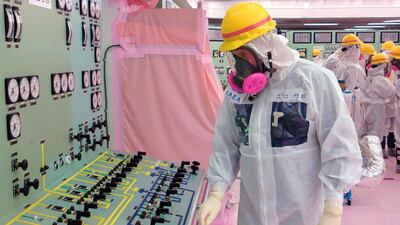Japan is offering experts and technology to the UAE to increase its nuclear energy co-operation with the country and share lessons learnt from the 2011 Fukushima disaster.
Professors with vast experience of the industry are being flown in to help train the Emiratis who aim to be the future of the country’s growing nuclear energy sector. Japanese companies have also provided essential parts for the UAE’s first nuclear power plant.
In 2011, Japan was hit by a tsunami that flooded more than 500 square kilometres of land, killed 15,000 people and injured another 6,000, while also causing the worst nuclear accident since Chernobyl in 1986.
“Japan experienced a very tragic situation, so we have to learn the lessons from this for the future of nuclear energy use,” said Kanji Fujiki, Japan’s ambassador to the UAE.
“Co-operation in this field is to cover all the issues that we are able to learn from Fukushima. We have workshops to discuss how people should react when such an emergency happens.”
Lectures are part of wider nuclear co-operation between the countries through an agreement signed in 2014 on the peaceful use of nuclear energy.
“The UAE is a very important country for Japan,” Mr Fujiki said. “I know very well that the relationship between both countries started even before the UAE’s foundation.
“But recently the situation has been changing and it is more diversified now in areas like education, nuclear energy, environment, health care and medicine.”
Japan will also help to develop human resources in nuclear science and engineering.
“Japanese experts come to universities in the UAE to teach the most updated science and technology,” Mr Fujiki said.
“It’s important because to keep the nuclear programme as safe and effective as possible there should be a sufficient amount of people who will support the safety, maintenance and operations aspects.”
Another area of co-operation is the development of desalination technology coupled with the UAE’s first power plant.
“That co-operation is based on the idea that nuclear energy should be used for the production of desalinated water to be used by the industry,” Mr Fujiki said. “A study is being carried out on the feasibility of this by a Japanese institute and the UAE.”
Japan has extensive nuclear experience and a well-developed industry, said Hamad Alkaabi, UAE ambassador to the International Atomic Energy Agency.
“We have various co-operation activities between the UAE and Japan in nuclear,” Mr Alkaabi said.
“One example is education with Khalifa University, where Japan’s experienced professors are seconded to teach classes.”
Japan has one of the largest nuclear industries, dating back to the 1950s.
“It has a large body of knowledge and expertise in nuclear and a large corps of experts, scientists, engineers, businessmen, critics and journalists who have looked after the nuclear business,” said Nobuyasu Abe, vice chairman of the Japan Atomic Energy Commission.
“That means there is a large reservoir of experts but very often the knowledge and expertise are divided into small compartments, and there is only a limited number who know and can talk about the whole picture.
“So in organising any event or course, it becomes critical to pick up the right talent for the specific purpose.”

